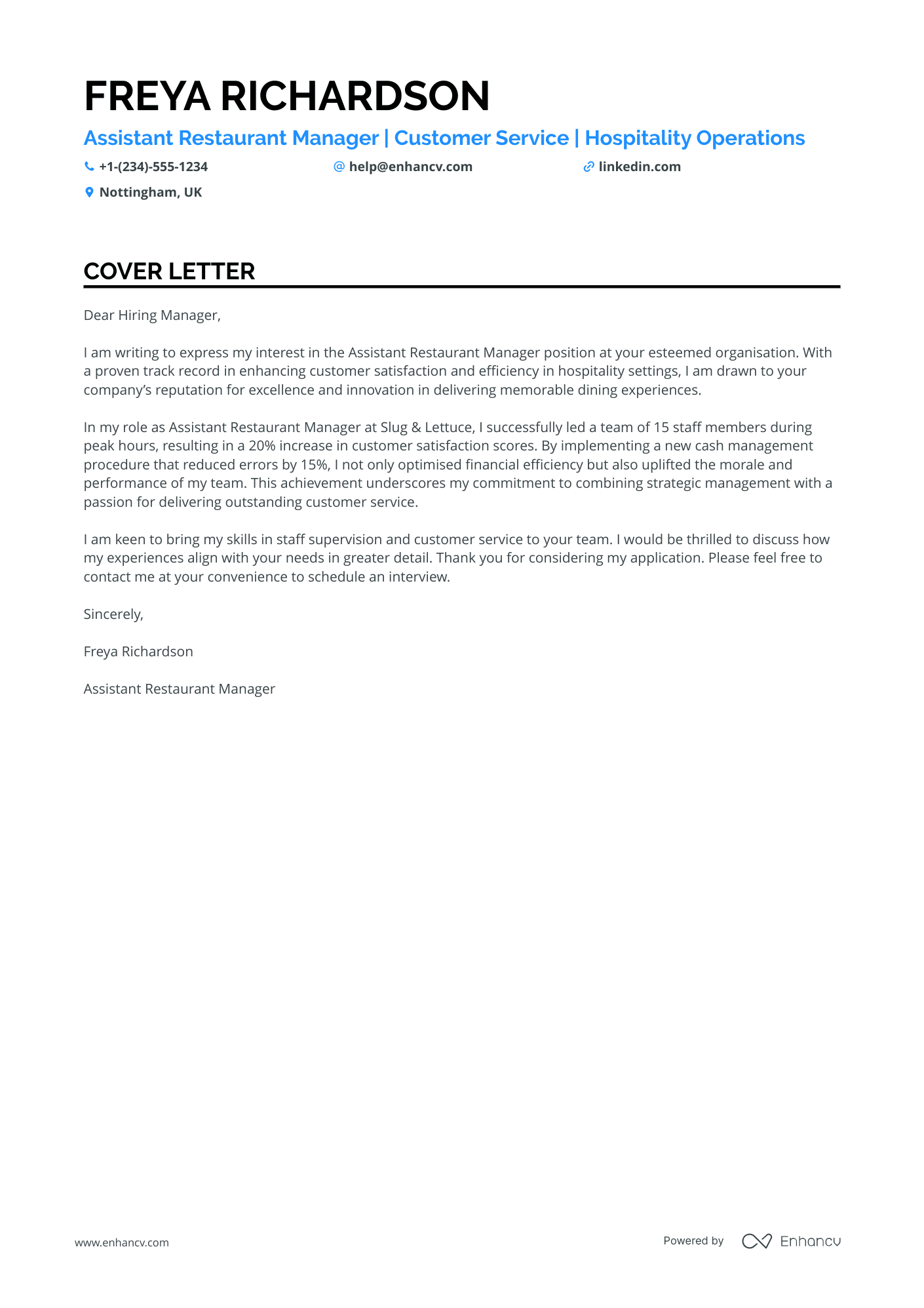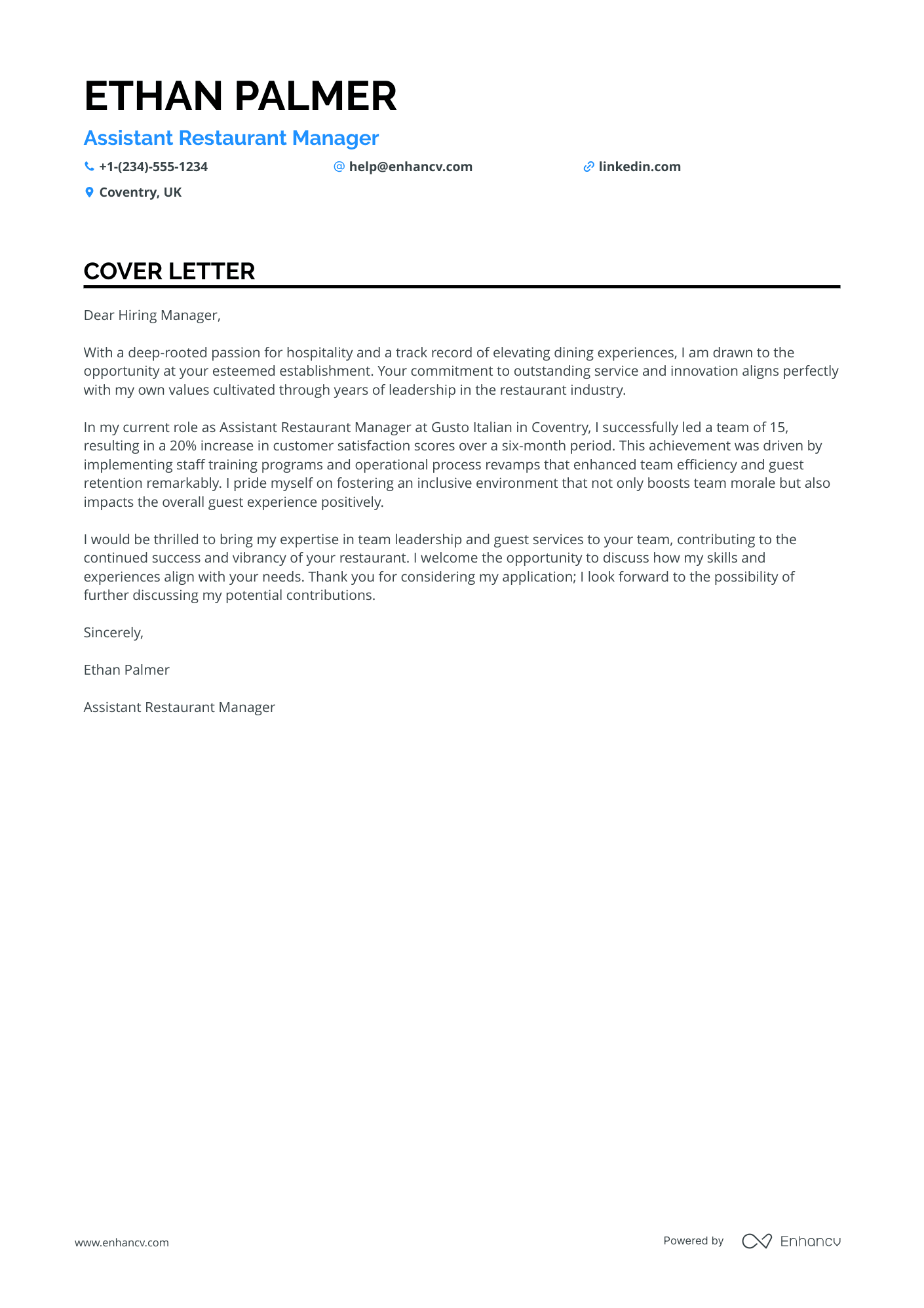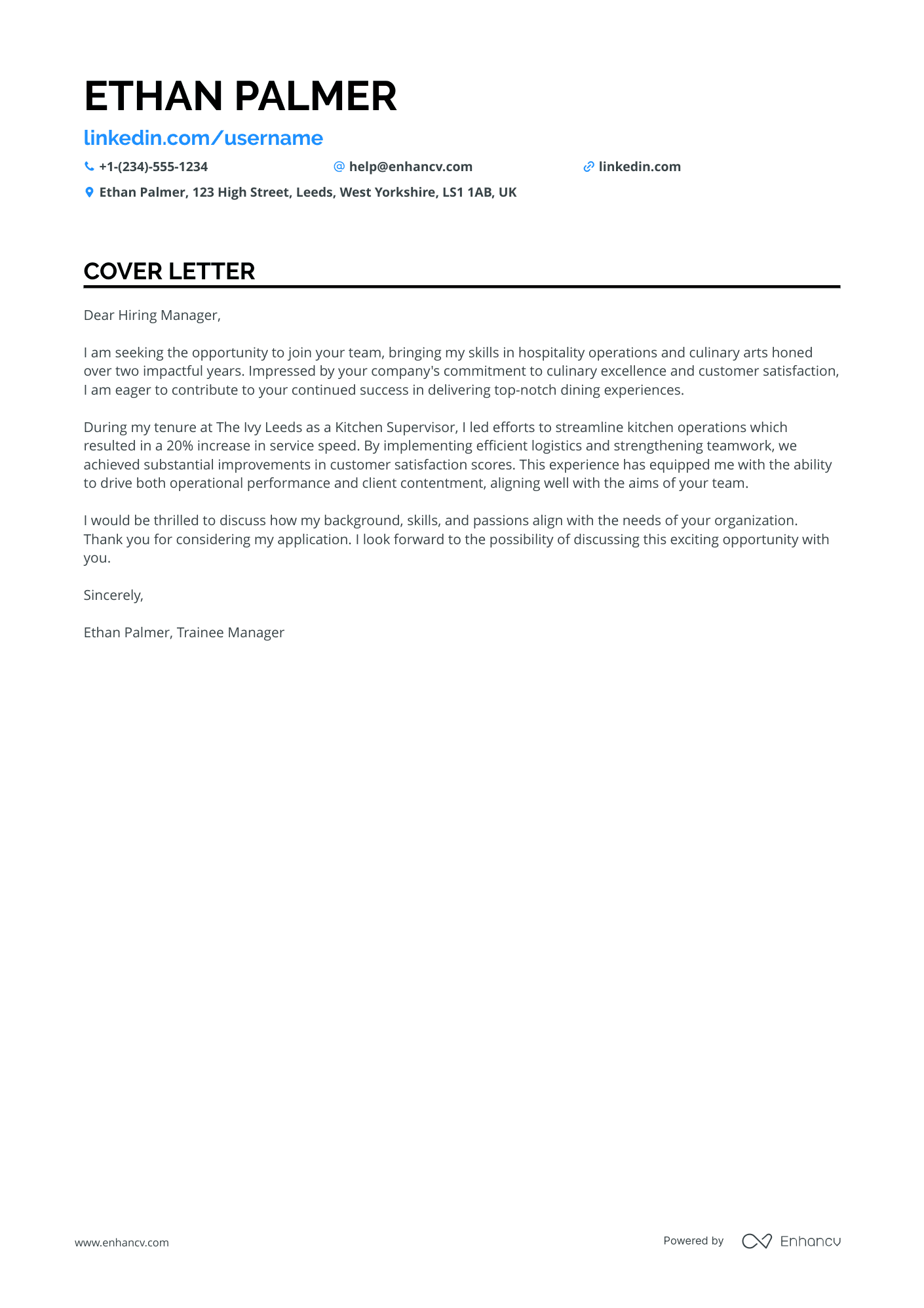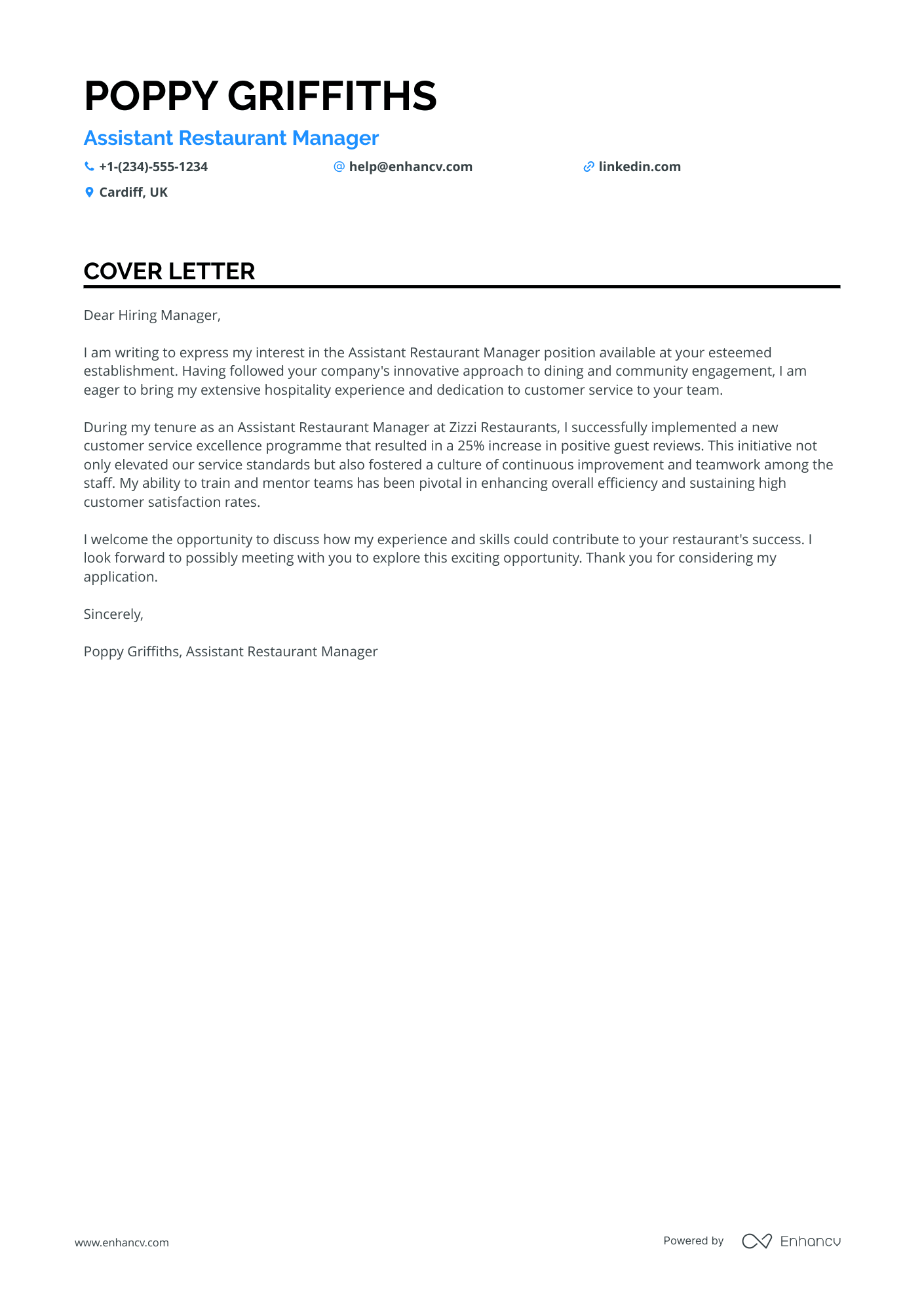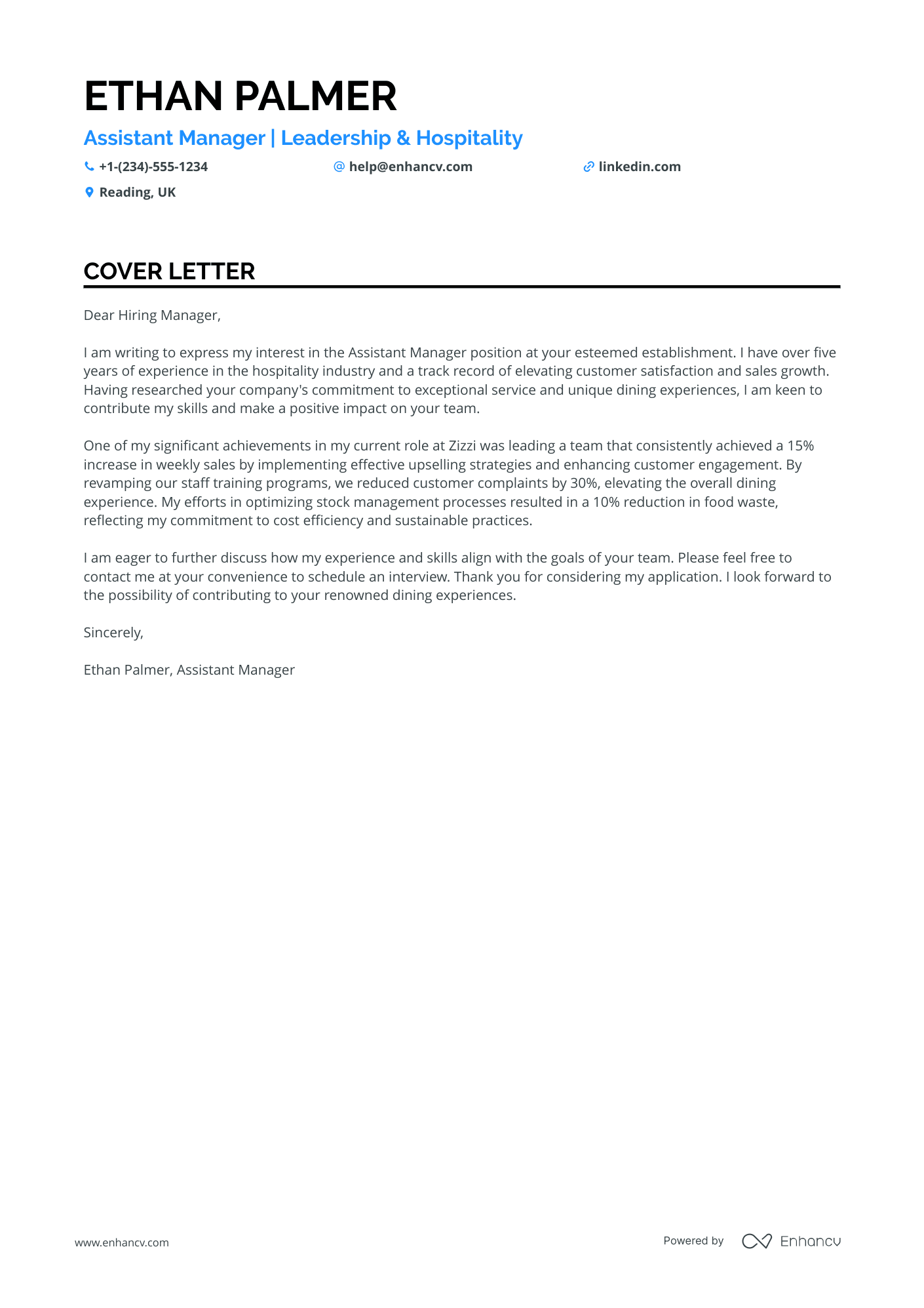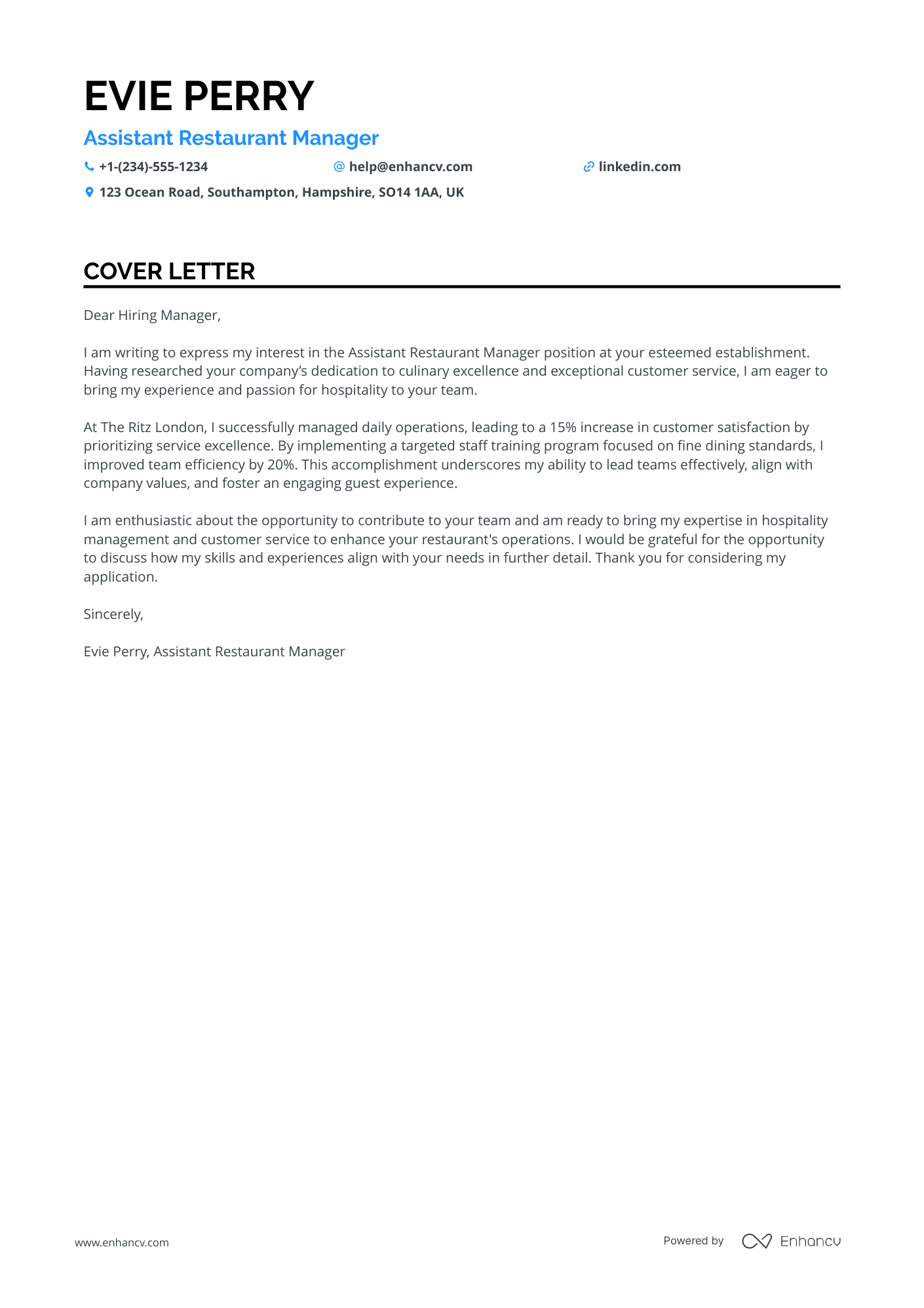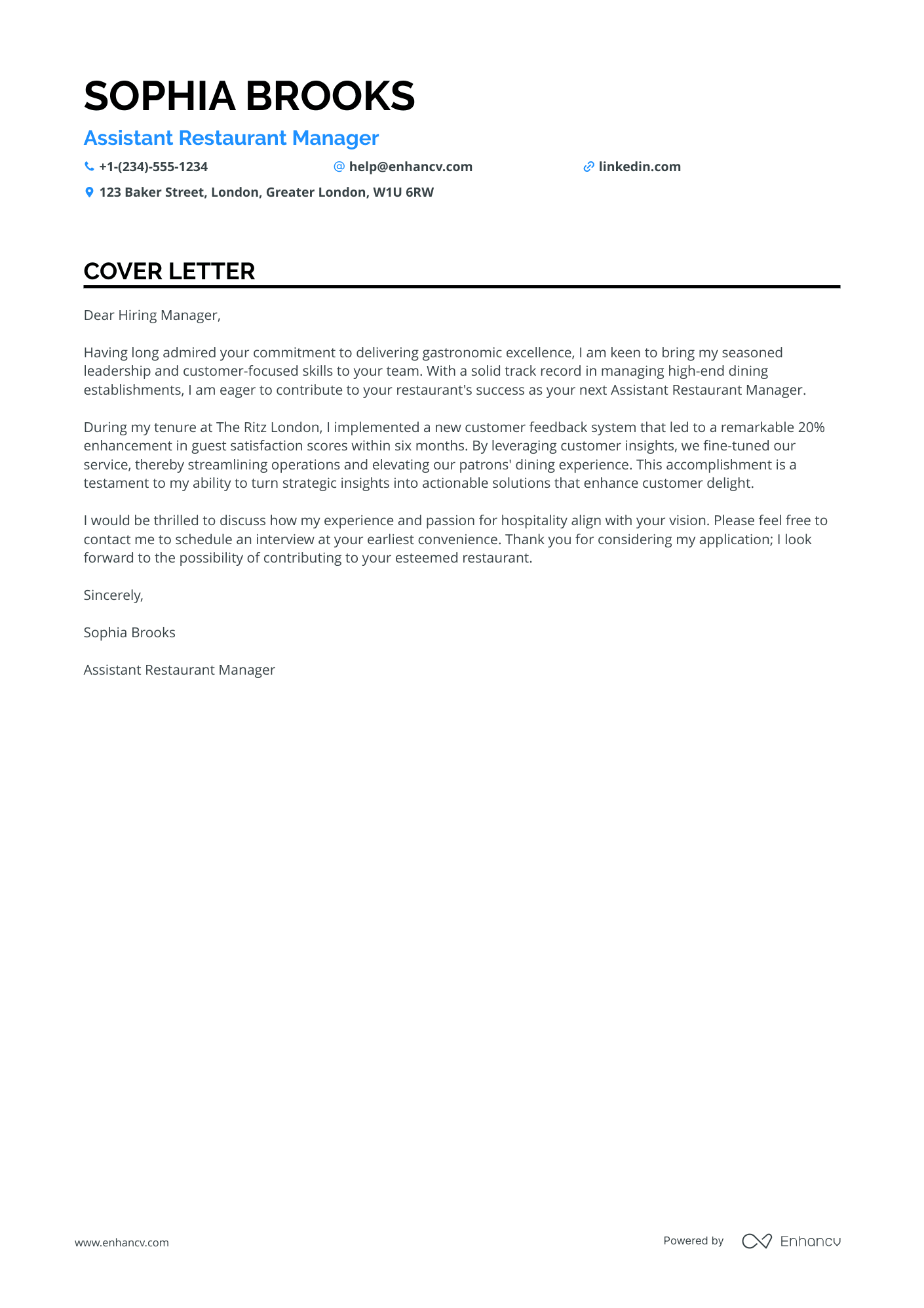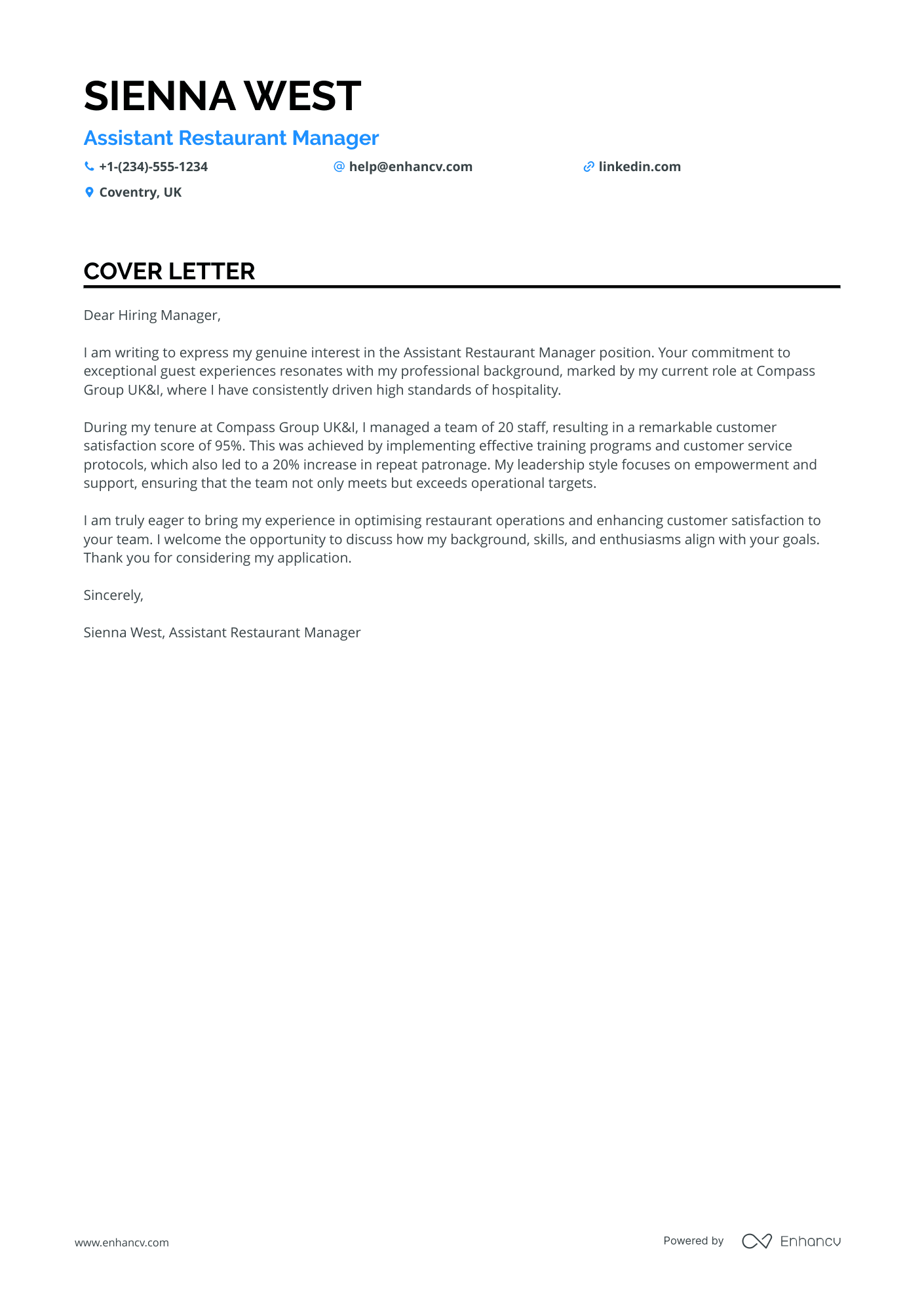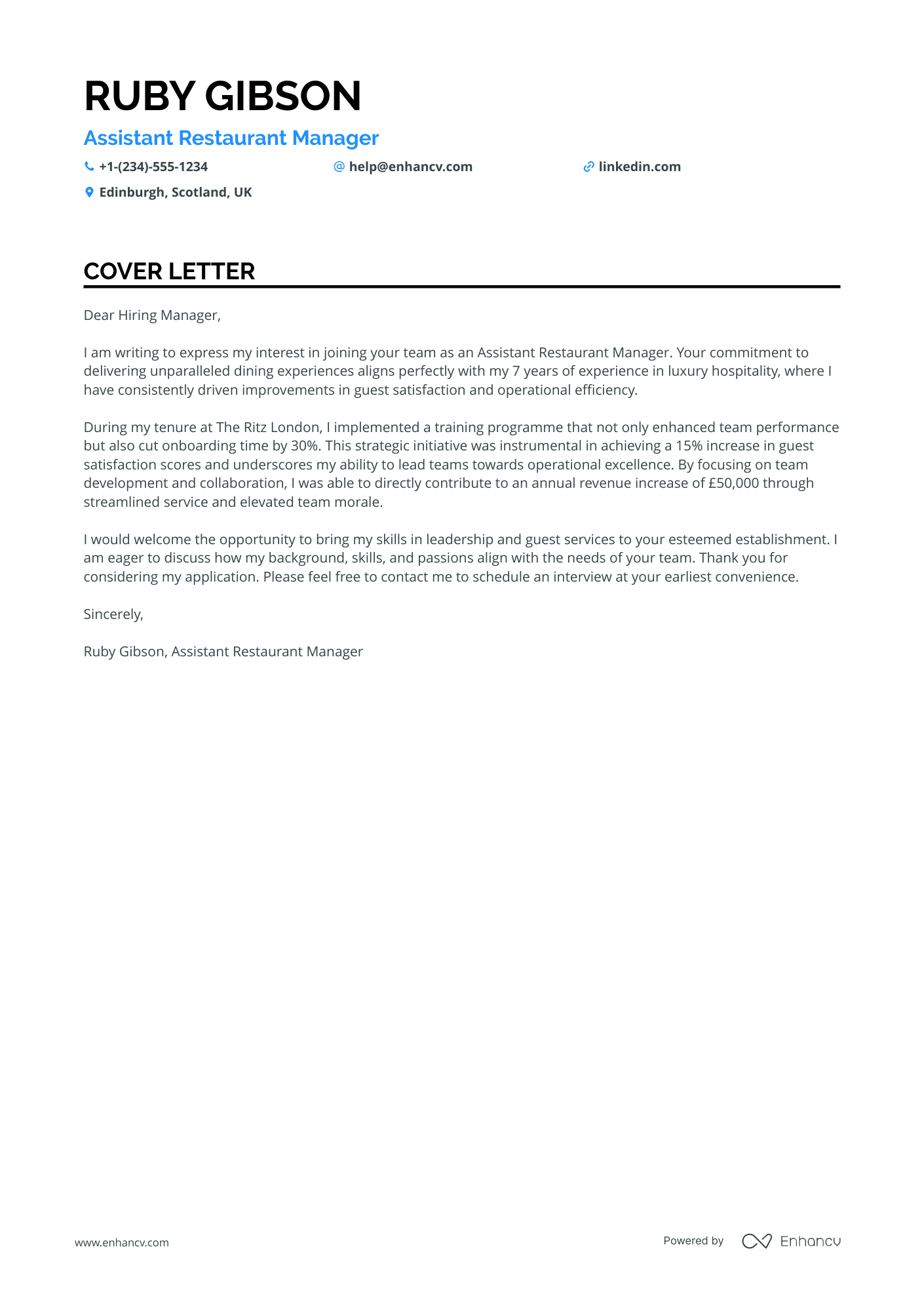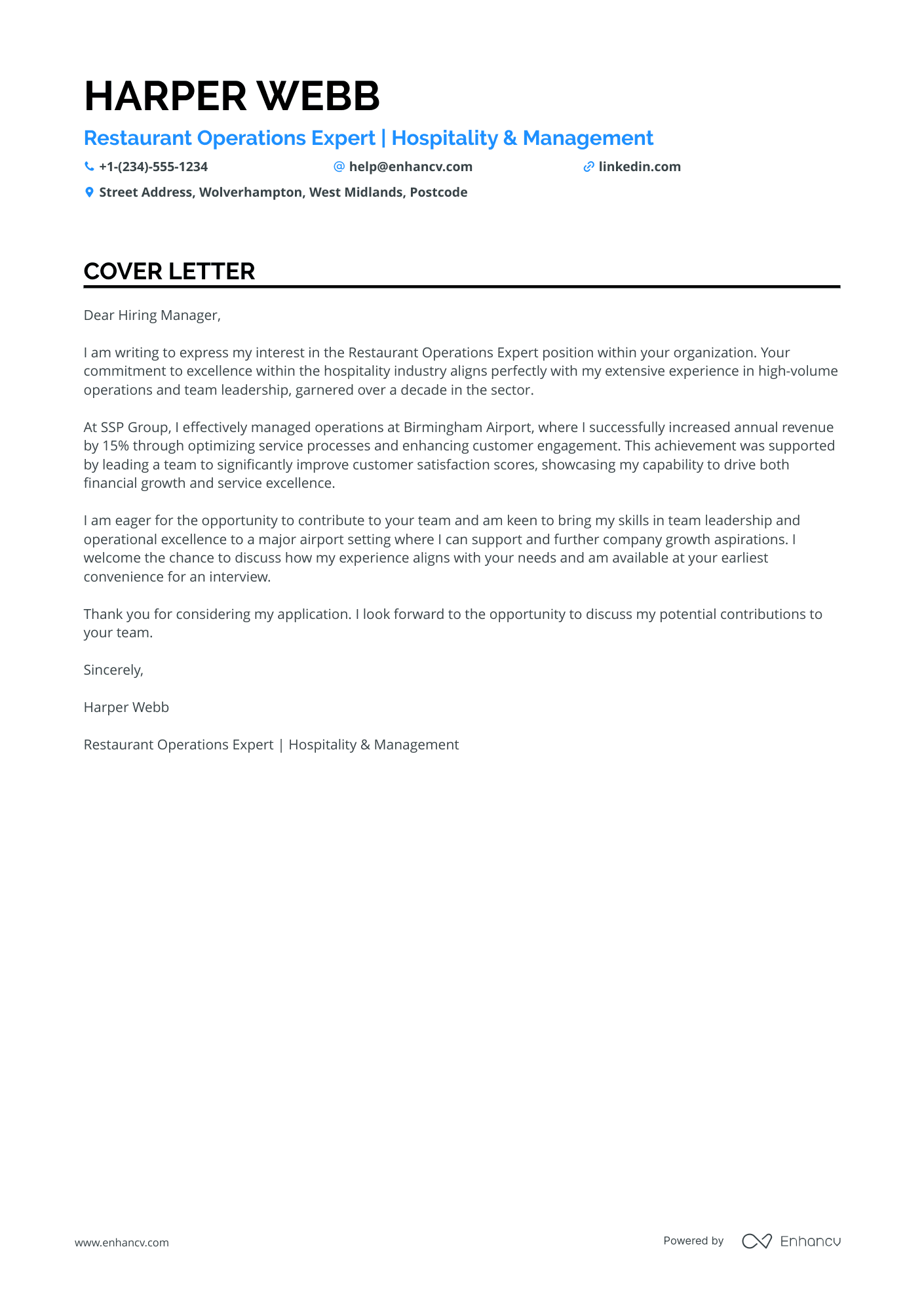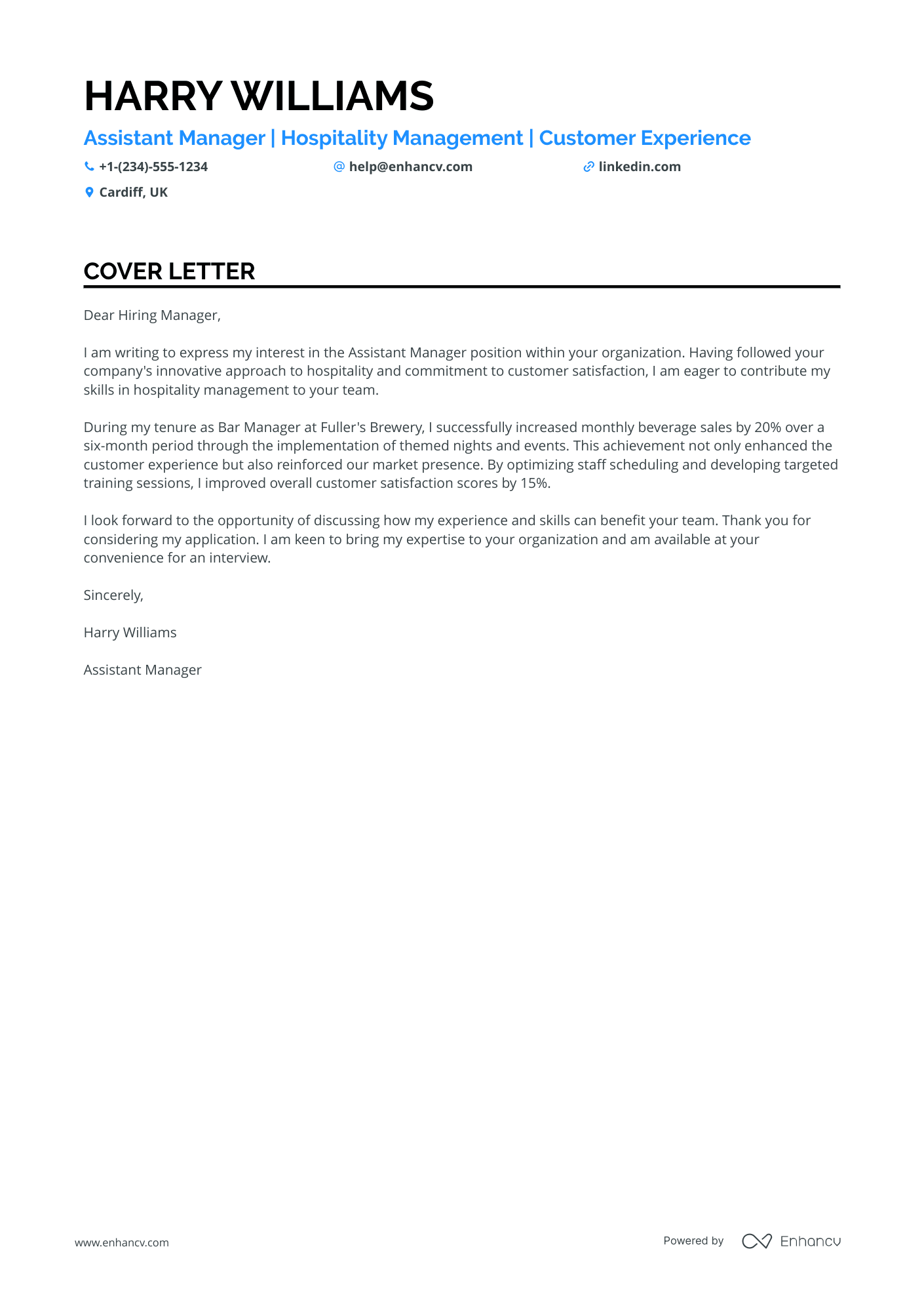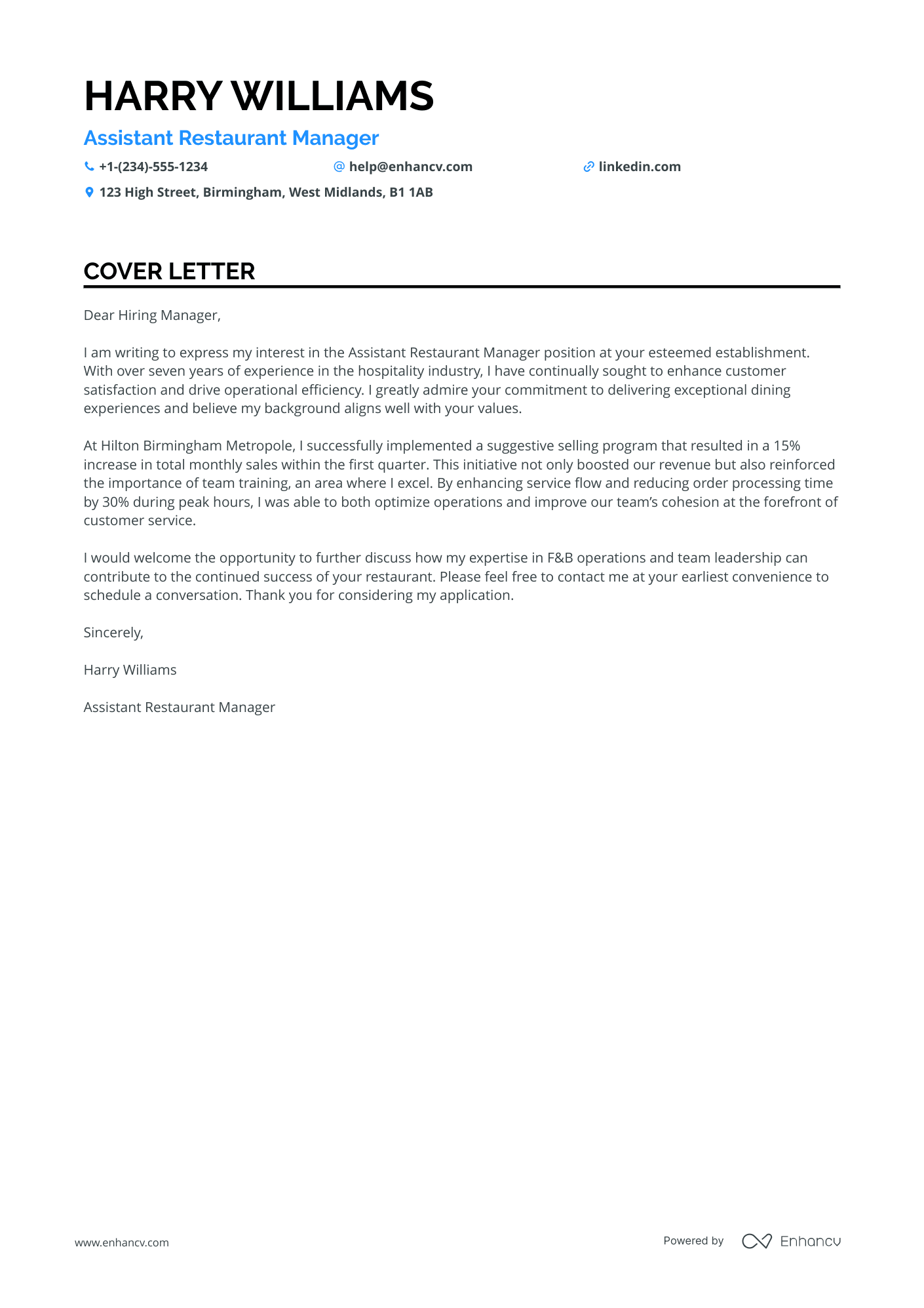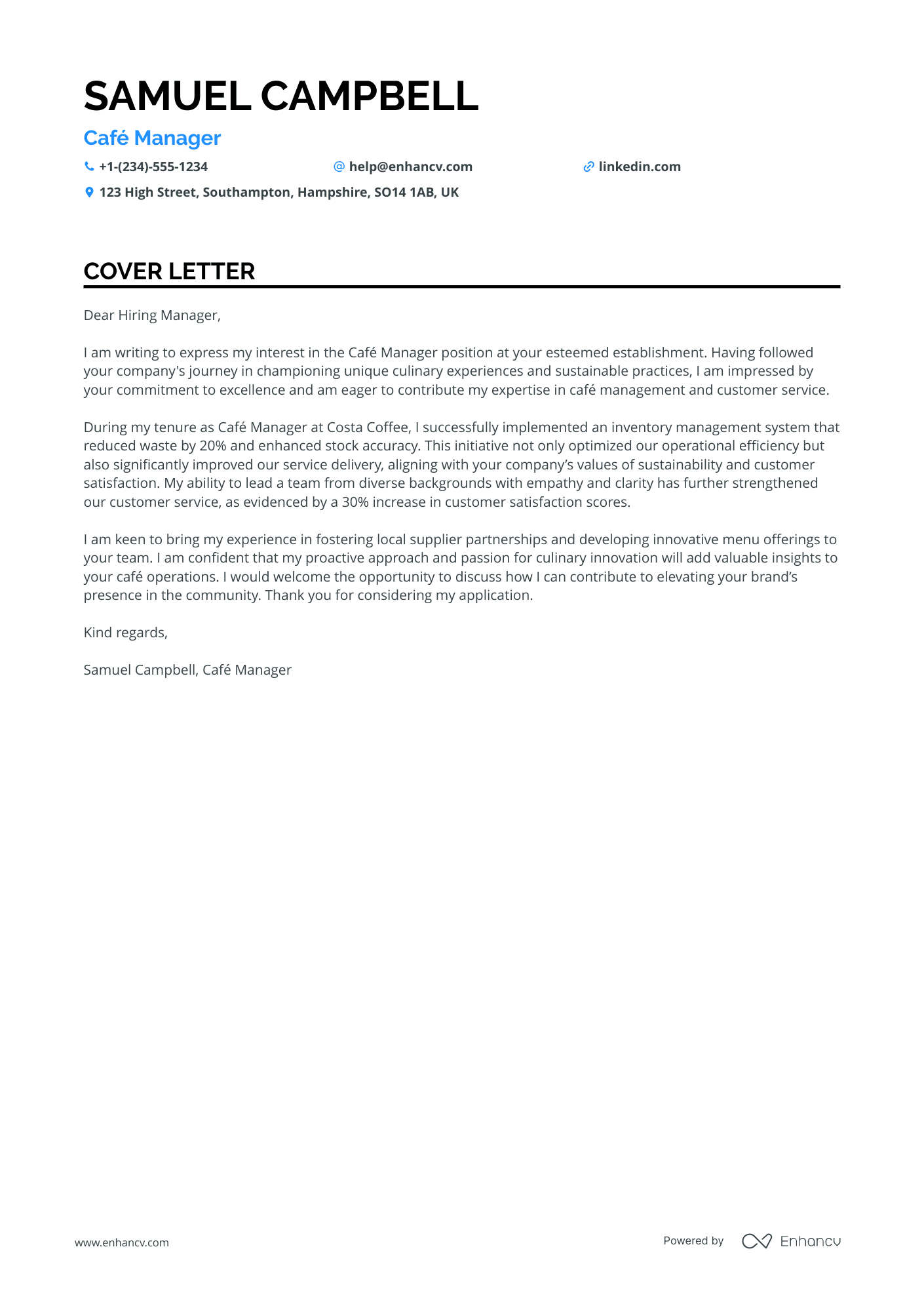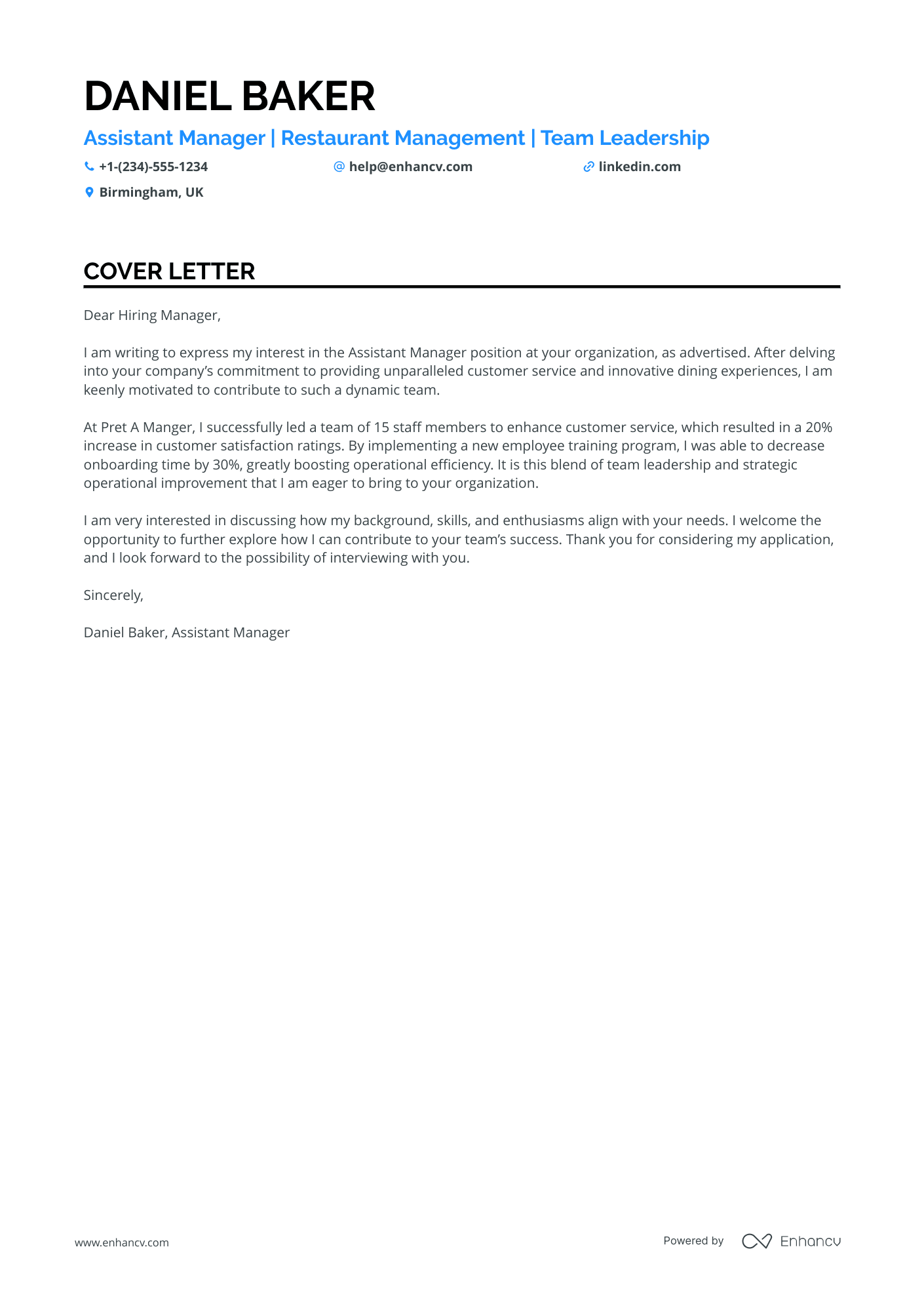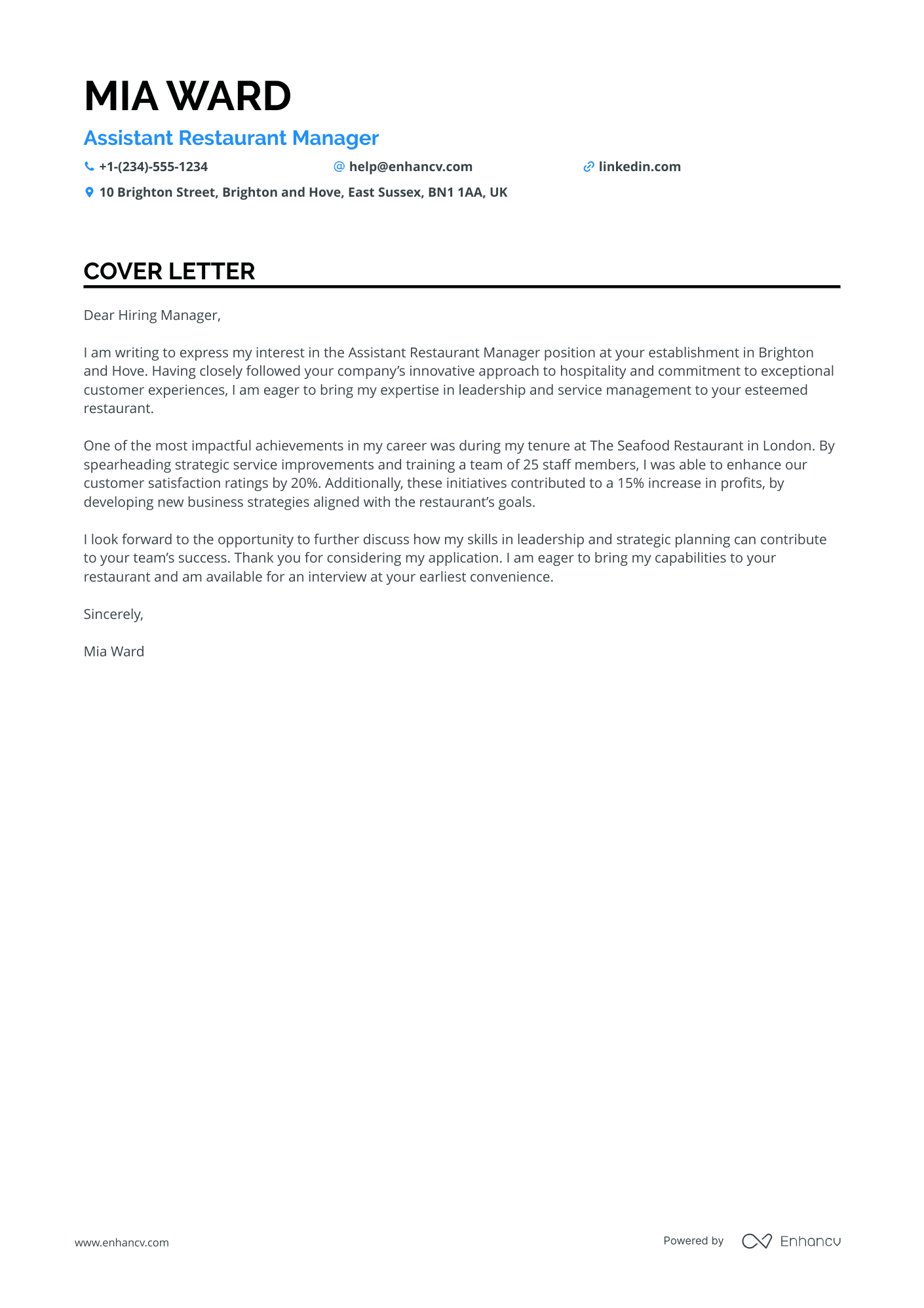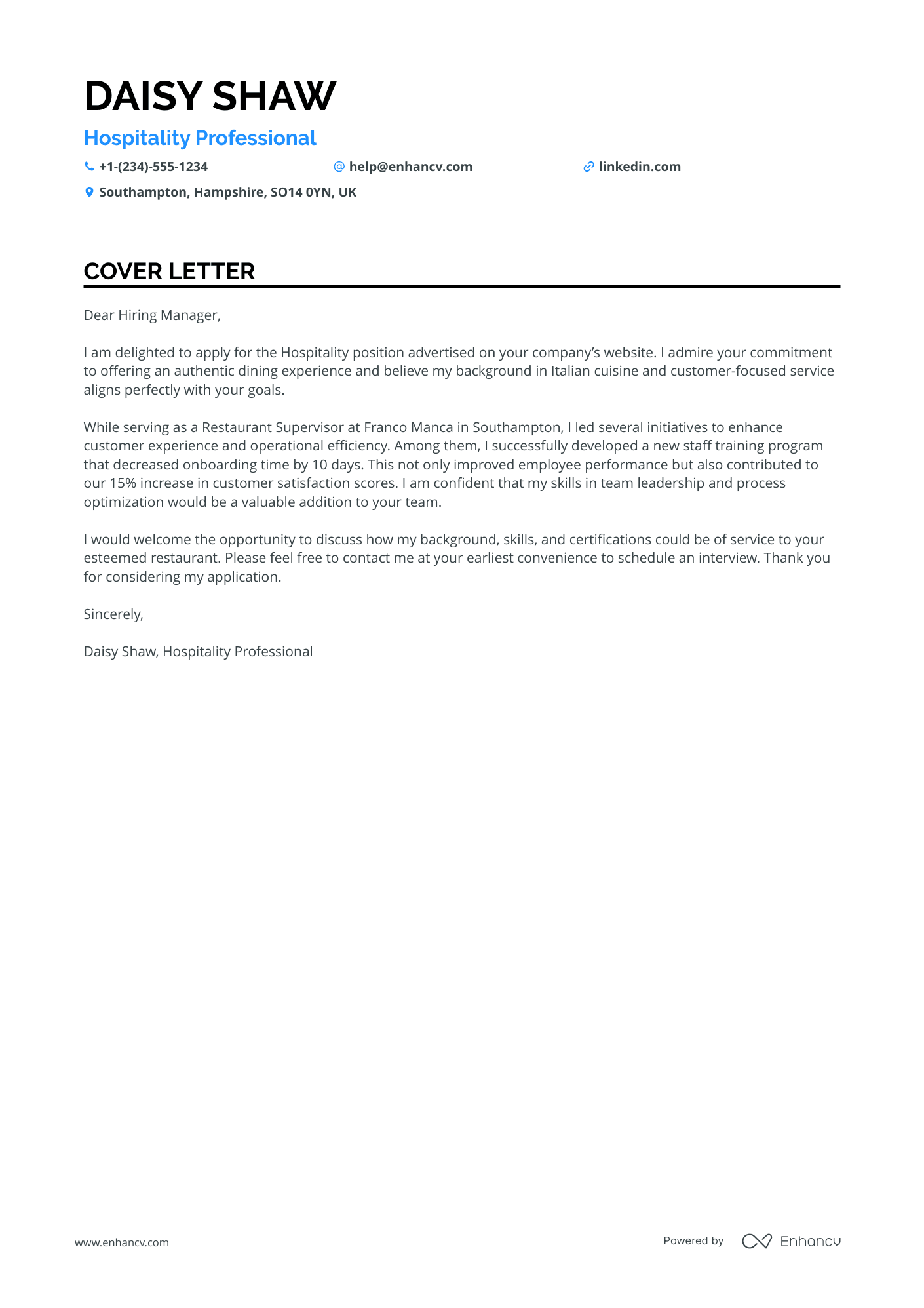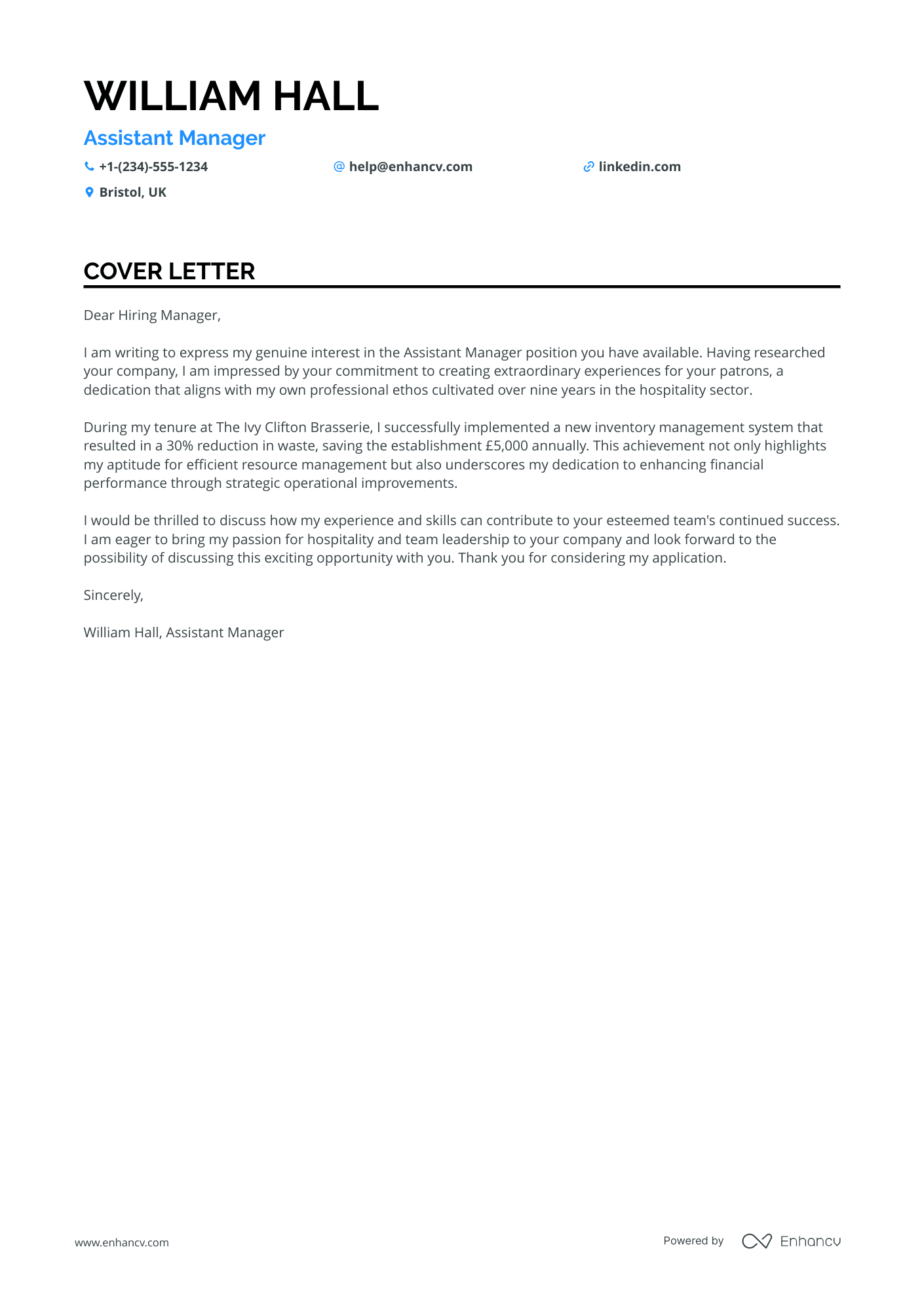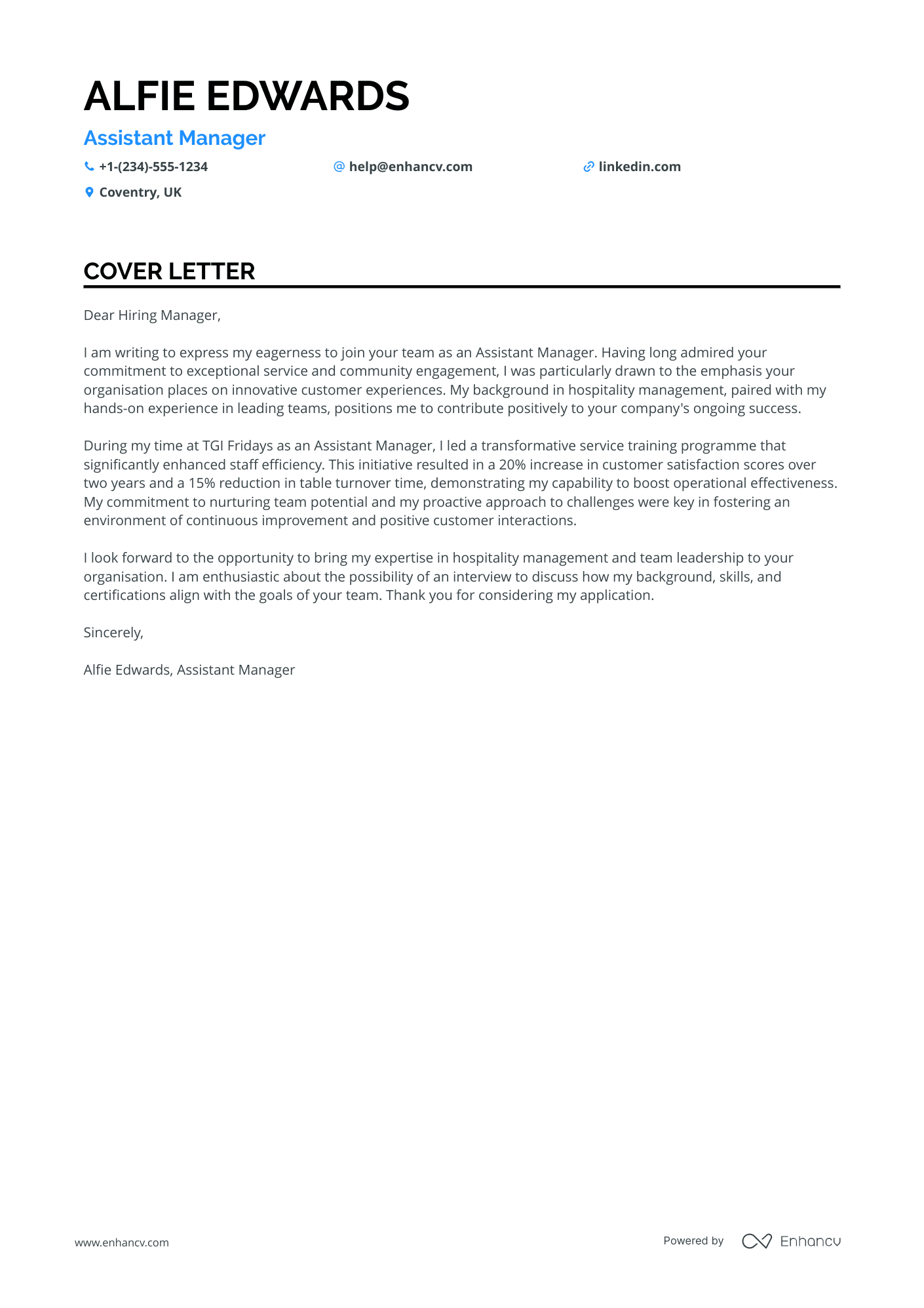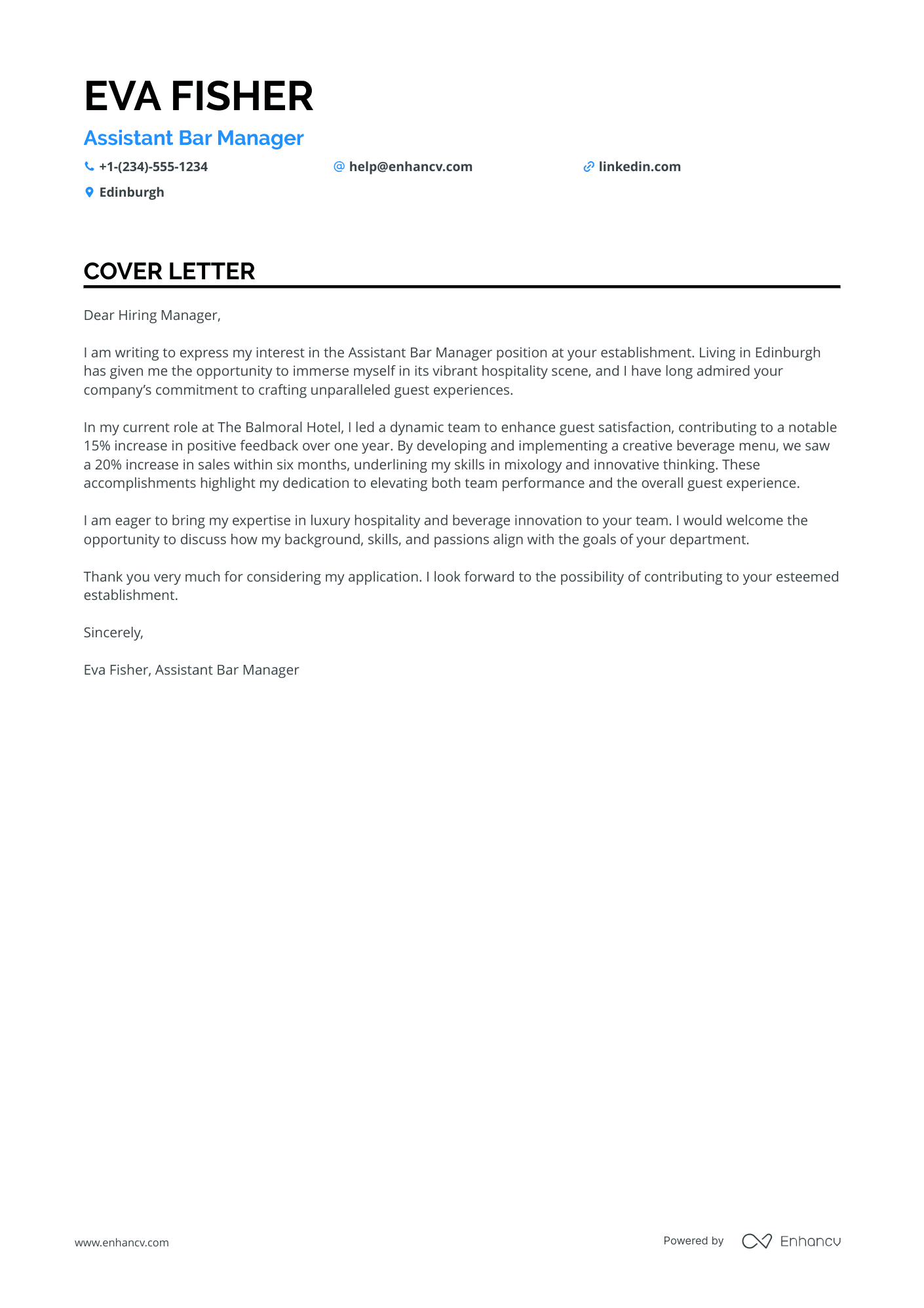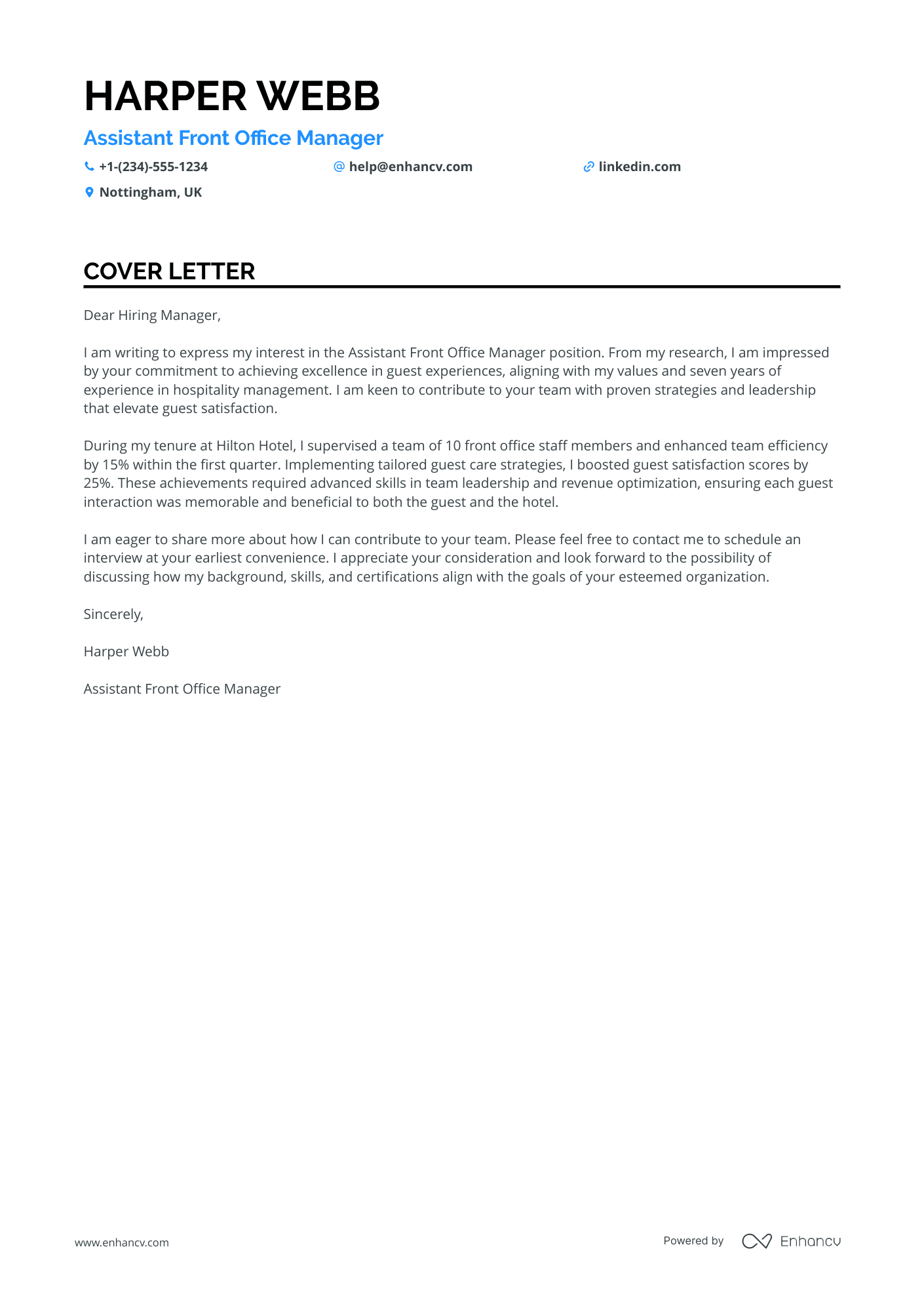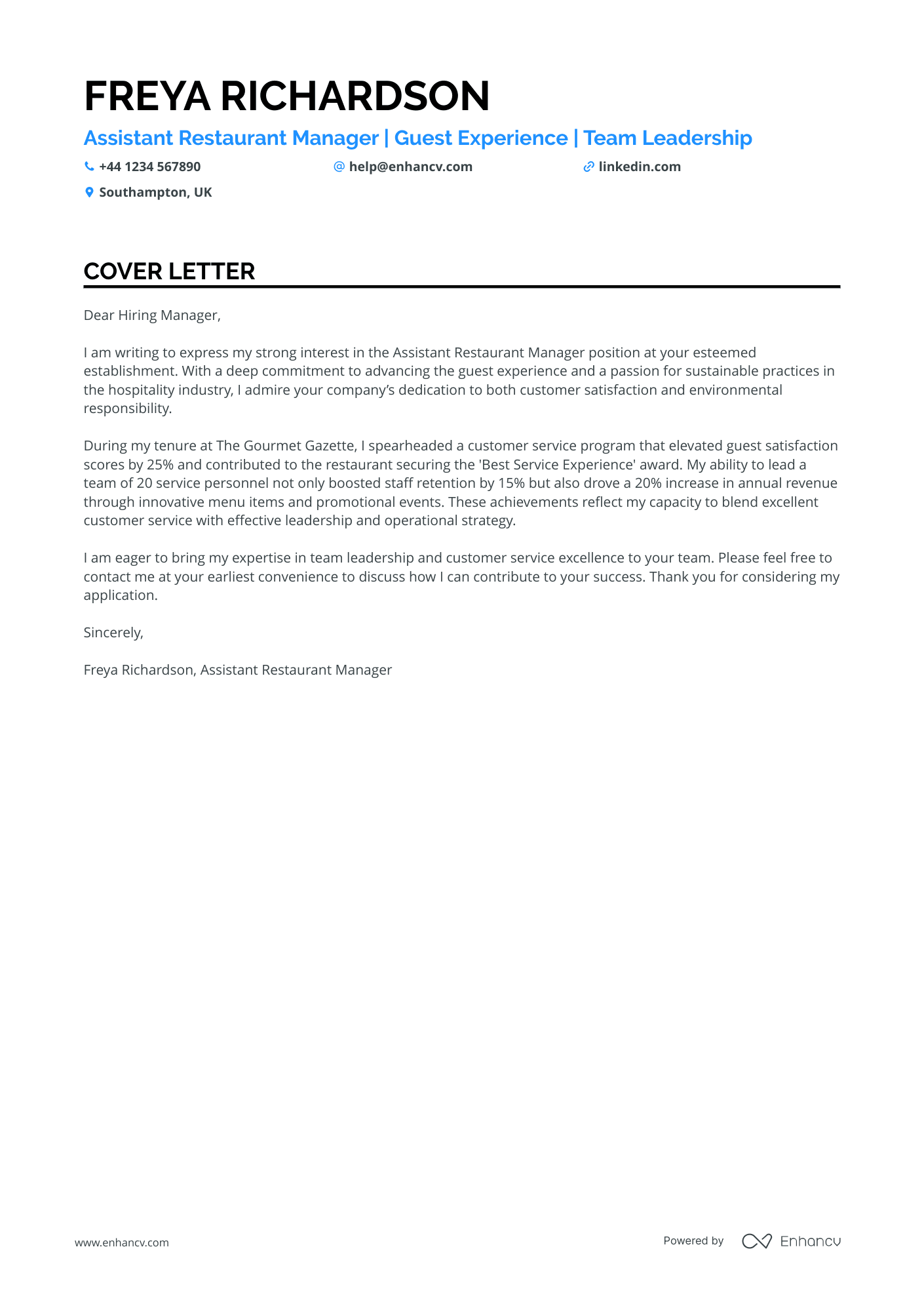Congratulations on completing your first cover letter. However, as you look back, you realise it’s simply a copy-paste of your CV.
Repeating your curriculum vitae is a common pitfall that many candidates encounter, making the cover letter redundant.
Your cover letter should provide fresh insights, adding more value to your application. It’s also the ideal space to address career gaps or major transitions that might not be covered in your CV.
In this guide, you’ll learn how to use your cover letter to demonstrate why you’re the best candidate for the role, while confidently addressing your career history and key achievements.
Cover letter examples for assistant restaurant manager
By Experience
Junior Assistant Restaurant Manager
- Highlighting leadership and organisational skills by discussing management of a team and events, which is crucial for the Assistant Restaurant Manager role.
- Mentioning the achievement of a '5-star' hygiene rating underlines your adherence to industry standards and ability to ensure compliance, a key responsibility in hospitality management.
- Citing the development of a staff training programme emphasises your commitment to staff development and your capability to improve operational efficiency through training.
- Referring to the implementation of a loyalty programme showcases innovative thinking in enhancing customer loyalty, aligning with strategic business goals in hospitality.
Senior Assistant Restaurant Manager
- Highlighting achievements such as a 20% increase in customer satisfaction scores and a significant rise in guest retention, emphasises the impact of team management and operational improvements.
- Inclusion of strategic roles like managing events and promotional activities demonstrates the ability to enhance brand visibility and drive revenue growth.
- Mentioning relevant certifications, such as the Advanced Restaurant Management course from the British Institute of Innkeeping, showcases commitment to professional development and relevant skills enhancement.
- Emphasising multilingual abilities, specifically English and Spanish, can improve communication with a diverse customer base, enhancing guest experience.
Trainee Assistant Restaurant Manager
- Emphasising leadership skills, such as mentoring a kitchen team and improving overall performance, which are essential for a managerial role in hospitality operations.
- Highlighting accomplishments in improving service efficiency and customer satisfaction, which are key factors in the hospitality industry's success.
- Showcasing relevant experience in inventory management and reducing food waste, demonstrating strategic thinking and cost-effectiveness.
- Listing specialised certifications in culinary management and food safety, underscoring a commitment to maintaining high operational standards.
Interim Assistant Restaurant Manager
- Emphasising leadership and mentorship experiences is crucial, as the role involves managing and training teams, which was effectively demonstrated through Poppy's achievements in improving team performance and customer satisfaction scores.
- Incorporating quantifiable achievements provides concrete evidence of success, such as increasing customer satisfaction by 25% and cutting supply costs by 15%, which strengthens the applicant's suitability for the role.
- Highlighting specific industry-related skills, such as expertise in inventory management and customer service excellence, aligns well with the operational demands of an Assistant Restaurant Manager.
- The inclusion of relevant certifications and courses, like the Advanced Restaurant Management and Effective Inventory Management Strategies, showcases a commitment to professional development and continuous learning.
By Role
Assistant Restaurant Manager for Fast Food Chains
- Tailored Experience: The cover letter effectively highlights Ethan's progressive roles in the hospitality industry, demonstrating a clear career trajectory that is aligned with the Assistant Manager role, showcasing familiarity with sales growth and team leadership.
- Relevant Skills and Achievements: The inclusion of specific accomplishments, such as improving customer return rates by 20% and reducing food waste by 10%, provides concrete evidence of Ethan's capabilities in enhancing business operations.
- Industry-Specific Interests: Mentioning a passion for Italian cuisine and exceptional dining experiences closely aligns with the hospitality focus of the role, indicating a genuine interest and potential for empathetic customer interaction.
- Professional Development: Highlighting courses such as "Advanced Leadership in Hospitality" demonstrates a commitment to continuous learning and acquiring specialised knowledge that is essential for career advancement in hospitality management.
Assistant Restaurant Manager for Fine Dining
- Highlight achievements in previous roles, such as the Customer Service Award and Sales Growth Initiative, to establish credibility and showcase the ability to enhance customer satisfaction and revenue.
- Emphasise skills like Hospitality Management, Complaint Resolution, and Service Recovery, which are crucial for success in a managerial role within the hospitality industry.
- Include details of pertinent education and courses such as the Associate's Degree in Hospitality Management and the Wine and Spirits Education course to demonstrate a solid foundation and specific expertise in the field.
- Mention language proficiency, such as being conversant in French, as it can enhance communication with a diverse clientele in the hospitality sector.
Assistant Restaurant Manager for Casual Dining
- Emphasise Relevant Experience: Highlighting experience in high-end dining, particularly at prestigious establishments like The Ritz London and Gordon Ramsay Restaurants, establishes credibility and relevance for the role of Assistant Restaurant Manager.
- Demonstrate Quantifiable Achievements: Including specific metrics such as a 25% improvement in customer service scores and a 10% reduction in food supply costs effectively showcases the impact of the applicant’s contributions.
- Leverage Industry-Specific Certifications: Mentioning certifications such as Advanced Restaurant Management and Food Safety Level 3 underscores specialised knowledge and commitment to industry standards.
- Highlight Leadership and Team Management Skills: Showcasing leadership abilities and successful team management at various levels, such as leading a team of 25 staff, are crucial for demonstrating potential as an effective assistant manager.
Assistant Restaurant Manager for Catering Services
- Emphasise team leadership skills by highlighting your success in managing diverse teams and improving staff performance, as this is crucial for an Assistant Restaurant Manager role.
- Mention certifications such as the "Advanced Food Safety and Management" accredited by the Chartered Institute of Environmental Health, which reinforces your expertise in maintaining high food safety standards.
- Showcase achievements in customer satisfaction and financial performance by listing specific metrics and improvements, demonstrating your impact on restaurant success.
- Highlight your adaptability and ability to streamline operations, which are essential skills for enhancing efficiency and achieving business targets in the hospitality sector.
Assistant Restaurant Manager for Hotel Dining
- Leadership and Team Management: The cover letter effectively highlights Ruby's leadership skills, which are crucial for an Assistant Restaurant Manager position, demonstrated by her experience in leading teams and improving performance.
- Guest Service Excellence: A recurring theme in the cover letter is guest satisfaction and service excellence, aligning with the job role's requirement to foster a welcoming environment and improve customer experiences.
- Operational Efficiency: The cover letter outlines significant achievements in improving operational metrics like service delivery time, waste reduction, and inventory management, essential for efficient restaurant management.
- Relevant Certifications and Courses: The inclusion of advanced hospitality management and food safety certifications shows a commitment to maintaining high standards in food service and operational excellence.
Assistant Restaurant Manager for Cruise Ship Dining
- Industry-Specific Certifications: The cover letter effectively highlights certifications such as 'Advanced Restaurant Management' and 'Customer Service Excellence', which are crucial for demonstrating acumen in managing high-volume operations and improving customer satisfaction in the hospitality sector.
- Quantifiable Achievements: The inclusion of precise figures, like a 15% revenue increase and reducing food waste by 10%, gives tangible proof of the candidate's abilities and their direct impact on the business.
- Relevance to Role: By focusing on experience within airport settings, the cover letter directly aligns the candidate's past responsibilities and successes with the potential employer's operational environment, showcasing suitability for a major airport context.
- Leadership and Team Development: The emphasis on leadership skills and team development, such as managing a team to achieve high customer satisfaction and promoting junior staff, underlines the candidate's capability to lead and enhance team performance, vital for a management role.
Assistant Restaurant Manager for Pub and Bar Operations
- Highlight strategic initiatives: The cover letter effectively showcases strategic initiatives such as hosting themed nights and events, which resulted in a 20% increase in beverage sales. Emphasising specific achievements in sales growth is crucial for an Assistant Manager role.
- Emphasise cost-cutting measures: The applicant effectively highlights cost-cutting measures like reducing waste by 30% and achieving a 15% reduction in overhead costs, which are important for management roles focused on operational efficiency.
- Demonstrate leadership skills: Demonstrating leadership through employee training and motivational programmes, which resulted in improvements in staff retention and customer satisfaction, is valuable in an Assistant Manager position.
- Showcase customer experience enhancement: The cover letter successfully illustrates improvements in customer experience, such as a 15% increase in satisfaction scores and streamlined front-of-house services, which are key components in hospitality management.
Assistant Restaurant Manager for Cafe Operations
- Emphasising leadership and team management skills with proven success in driving a 15% revenue increase through effective team training aligns well with the expectations for an Assistant Restaurant Manager role.
- Highlighting achievements such as a 12% increase in customer satisfaction scores demonstrates capability in improving guest experiences, a critical aspect of hospitality management.
- Certifications in leadership and management from Chartered Management Institute underscore the candidate's dedication to professional development in team leadership and personnel management.
- Experience with implementing eco-friendly practices and sustainable living can appeal to organisations focusing on environmental sustainability, aligning with modern industry trends.
Assistant Restaurant Manager for Bakery Operations
- Focus on Achievements: Clearly detailing past accomplishments, like implementing a new inventory management system that reduced waste by 20% and improved stock accuracy, demonstrates the candidate's ability to deliver measurable results.
- Highlighting Leadership Experience: Illustrating leadership roles, such as leading a team to increase customer satisfaction scores by 30%, showcases the candidate's proven track record in managing and developing teams.
- Demonstrating Innovation: Mentioning the development of a seasonal menu that resulted in a 25% increase in daily sales helps emphasise the candidate’s capability to innovate and drive business growth.
- Certifications and Courses: Including relevant certifications like Advanced Food Safety from the Chartered Institute of Environmental Health indicates a commitment to professional development and adherence to industry standards.
Assistant Restaurant Manager for Vegetarian Cuisine
- Emphasising leadership and team management skills is crucial, as demonstrated by the candidate's experience in leading sizeable teams and implementing successful operational strategies.
- Highlighting measurable achievements, such as increased customer satisfaction ratings and reduced employee turnover, can effectively showcase the candidate's impact in previous roles and their potential contributions to a new role.
- Showcasing relevant certifications and courses like "Effective Restaurant Management" and "Hospitality Leadership and HR Management" underscores continuous professional development and expertise in restaurant operations and leadership.
- Including a summary statement that encapsulates the candidate's experience and eagerness to contribute to the potential employer sets a professional and forward-looking tone.
Assistant Restaurant Manager for Seafood Cuisine
- Highlighting experience in hospitality leadership and team mentoring, emphasising over five years of progressive responsibility in the industry.
- Demonstrating a significant track record of improving customer satisfaction and retention rates through strategic service implementation, showcasing measurable results such as a 20% increase in satisfaction.
- Showcasing accomplishments in operational efficiency and financial success, like a 15% increase in profits and 30% reduction in service errors through strategic planning and training.
- Emphasising strong compliance and regulatory achievements, such as receiving top scores in health inspections by maintaining rigorous standards.
Assistant Restaurant Manager for Italian Cuisine
- Highlight specific experience in overseeing restaurant operations, such as the role of Restaurant Supervisor, where increased guest loyalty and service speed were achieved.
- Emphasise the unique skills in Italian cuisine and how they align with the role at a family-run business, supporting the narrative with an Introduction to Italian Culinary Arts course.
- Showcase accomplishments in team leadership and training program development, particularly the creation of a program that significantly decreased onboarding time and turnover.
- Include relevant achievements like the Menu Innovation Award, underscoring the candidate's ability to develop successful and profitable menu items, boosting bar revenue.
Assistant Restaurant Manager for Asian Cuisine
- Highlighting experience in team leadership and management, crucial for roles such as Assistant Manager in the hospitality industry, showcasing the candidate's ability to lead and develop a successful team environment.
- Emphasising achievements in increasing operational efficiency and reducing costs, such as the implementation of a new inventory management system, demonstrates a proactive approach to improving business practices.
- Mentioning specific training and courses completed, like Advanced Food Safety and Leadership Skills for Managers, enhances credibility and shows commitment to maintaining industry standards and continuous personal development.
- Illustrating the ability to handle customer grievances effectively and maintain high customer satisfaction rates is vital in hospitality roles where customer service is paramount.
Assistant Restaurant Manager for Mexican Cuisine
- Highlight Leadership Skills: Emphasise leadership abilities and achievements such as successfully managing teams, increasing staff retention, and improving customer satisfaction metrics.
- Showcase Quantifiable Achievements: Include specific statistics and outcomes, such as a 30% increase in customer satisfaction and a 25% boost in off-peak sales, to demonstrate effectiveness in previous roles.
- Emphasise Relevant Skills: Focus on hospitality management, customer service, inventory control, and staff training, highlighting proficiency in skills critical to the hospitality industry.
- Outline Educational Background and Courses: Mention relevant educational credentials, such as an Associate Degree in Hospitality Management, and completed courses that enhance professional expertise, like Advanced Restaurant Management from Cornell University.
Assistant Restaurant Manager for French Cuisine
- Showcasing Leadership Experience: Highlighting the candidate's role in leading teams and achieving higher guest satisfaction scores demonstrates the skills necessary for managerial roles, especially in luxury hospitality.
- Emphasising Innovative Mixology: Mentioning accomplishments such as developing a beverage menu that led to increased sales illustrates creativity and initiative, vital in maintaining a competitive edge in the bar industry.
- Detailing Achievements with Quantitative Results: Including specific achievements with measurable outcomes, such as a 20% increase in sales, provides tangible evidence of the candidate’s ability to drive success and improvements.
- Highlighting Relevant Education and Courses: Referencing specific education and courses related to hospitality and mixology adds credibility and shows dedication to professional growth in the field.
Assistant Restaurant Manager for Buffet Operations
- Experience Highlighting: The candidate effectively outlines their extensive experience in front desk management by highlighting their roles across several reputable hotels, such as Hilton and Marriott, showcasing their progressive career growth within the industry.
- Achievements and Metrics: The cover letter incorporates quantifiable achievements, such as increasing guest satisfaction scores by 25% and enhancing team efficiency by 15%, providing evidence of the candidate’s impactful contributions in previous roles.
- Skill Emphasis: A strong focus is placed on essential skills related to the role, such as Guest Experience, Team Leadership, and Revenue Optimisation, aligning with the core competencies required for an Assistant Front Office Manager role.
- Education and Continuous Learning: By including an Associate Degree in Hospitality Management and additional courses from respected institutions like Cornell University, the candidate demonstrates a commitment to continuous professional development.
Assistant Restaurant Manager cover letter example
Freya Richardson
Southampton, UK
+44 1234 567890
help@enhancv.com
- Highlight specific achievements that demonstrate successful leadership and customer service improvements, as these are crucial for an Assistant Restaurant Manager role.
- Mention awards or recognitions received that emphasize expertise and success in improving the guest experience and operational excellence, adding credibility to managerial capabilities.
- Include measurable outcomes, such as percentage improvements in customer satisfaction and revenue, which illustrate the applicant’s impact on previous employers and potential to contribute positively to the prospective employer.
Importance of cover letters in the United Kingdom
Cover letters are a vital part of professional job applications, helping shape recruiters' first impression of your profile.
Here’s why they’re important:
- Indicates your genuine interest: A well-researched cover letter reflects your knowledge of the company and role.
- Professionalism from the outset: Employers expect your cover letter to be structured, polite, and formal. If you wish to add a more personalised touch, be sure to address your recipient directly.
- Capture the recruiters' attention: For most roles, candidates tend to have rather similar experience, which is why you should use your cover letter to explain what is unique about your profile.
What UK employers expect from a cover letter
You only have one chance to impress your potential UK employers, so be wise about writing your cover letter.
When doing so, follow these three simple but essential steps:
- Do your research: Begin by researching the company and the role you're applying for. Check their website, social media pages, and relevant news to understand what drives their business.
- Highlight company values: Identify the company's core beliefs and explain how your personal and professional experiences resonate with them. For instance, if the organisation prioritises innovation, provide examples where you've demonstrated creative thinking.
- Match your skills to the job: Analyse the job description carefully and pick out the most important skills or qualifications they’re seeking. Be sure to mention your relevant achievements that prove you're the perfect fit for the position.
How to format a assistant restaurant manager cover letter
Before diving into the content, the structure of your cover letter should include the following elements:
- Your address and contact details
- The employer’s name and address
- Date
- Salutation or greeting
- Opening or introductory paragraph
- Middle or body paragraphs
- Closing paragraph
- Sign-off and signature
When it comes to the best font choice, consider modern options like Lato, Rubik, Raleway, Volkhov, Chivo, or Bitter as alternatives to Arial or Times New Roman.
Your cover letter should be single-spaced, with approximately 1-inch (2.5 cm) margins all around (our templates are set up automatically with this spacing in mind).
Ensure your CV and cover letter use the same font for consistency, and always send them as a PDF to prevent edits and maintian formatting.
Lastly, while Applicant Tracking Systems (ATS—the software used to match your application to set requirements) won't read your cover letter, recruiters certainly will, so make sure it stands out.
How to write your assistant restaurant manager cover letter salutation
In a world of AI and instant prompts, taking the extra time to personalise your cover letter truly makes a difference.
Address the hiring manager directly with a customised greeting (e.g., 'Dear Mr Bond', 'Dear Ms Penny').
You can often find their name on LinkedIn (under the job listing or by searching) or in the ‘About’ or ‘Meet the Team’ section of the company's website. If in doubt, you can also contact the reception for assistance.
If you can't find the name, rather than using 'Dear Sir or Madam', opt for something more personal, such as 'Dear [Company Name] Hiring Manager'.
How to write your assistant restaurant manager cover letter intro
It's never a bad time to show enthusiasm about the role, company, or team in your cover letter introduction.
Begin by sharing one or two aspects that genuinely excite you about the position—whether it's the company culture, specific responsibilities, or the team's past achievements.
Your enthusiasm demonstrates that you'll bring a strong work ethic, are eager to contribute, and are motivated to succeed.
How to write your assistant restaurant manager cover letter body
Your cover letter body is the most spacious and vital part of this document—it highlights your true value and the impact you can bring as a candidate.
Remember, your cover letter serves a different purpose to your CV. Here, you need to show your skills in context by telling the story of one significant achievement, hinting at how you’ll help your future employer achieve their goals.
So, when writing your cover letter body:
- Use concrete achievements to demonstrate your personality and impact.
- Support your achievements with quantifiable data and metrics.
- Tell the story of a successful project you’ve worked on and explain how you contributed to the outcome.
- Highlight both hard and soft skills to make your story more engaging.
- Focus on skills that are most relevant to the role and align with the company’s needs.
How to write a closing paragraph
There’s a wrong and a right way to close your cover letter. Here’s how.
The wrong way is to end with a signature or a formal 'Thank you in advance.'
The right way is to either promise how you’d make a positive impact on the company or ask when you can expect a response. This will highlight you as a forward-thinking candidate who’s enthusiastic about securing the role.
Conclusion
Your cover letter is an opportunity to showcase your personality and skills to potential employers. Start by addressing the hiring manager by name and tailoring your content to reflect the role’s requirements.
Include a specific example of your greatest achievement to illustrate your suitability for the position, while also expressing your enthusiasm for the company. Remember to format your letter professionally, ensuring it aligns seamlessly with your CV.
